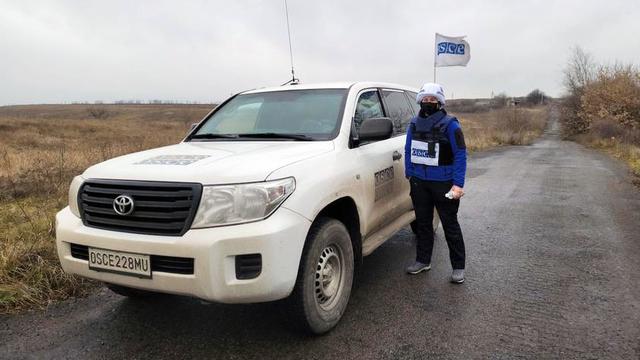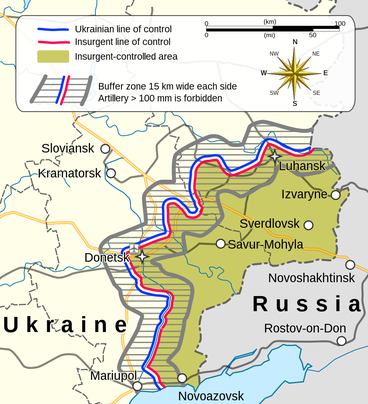Colleen Ryan (MHR ‘21) is a Master of Human Rights alumna with nearly a decade of academic and professional experience in security sector reform.
From 2015 to 2021 she worked as a police officer for the Minneapolis Police Department (MPD) where she responded to mental health calls alongside clinicians as part of the innovative Co-Responder Pilot Program.
During the June 2020 Black Lives Matter demonstrations in Minneapolis, Ryan spoke with GQ Magazine to discuss what she described as the “toxic culture” of the MPD, for which she was disciplined by then-MPD Chief Medaria Arradondo.
After leaving the Minneapolis Police Department in October 2021, Ryan became a monitoring officer for the Organization for Security and Co-operation in Europe’s (OSCE) Special Monitoring Mission to Ukraine. Ryan and the other monitors were evacuated from Ukraine in mid-February, less than two weeks before Russia invaded that country.
We asked her to tell us more about her experience in Ukraine, and how her human rights degree prepared her for her career. Her responses below were taken from a February 21 interview with the Human Rights Program, and from a March 16 Humphrey School forum regarding the war in Ukraine. Responses have been edited for clarity.
What were your responsibilities as an OSCE monitoring officer?
Our role was to monitor the implementation of the 2014 and 2015 Minsk Agreements, which were designed to end the war begun by Russian-backed separatists in the Donetsk and Luhansk regions in eastern Ukraine. These two regions have been in dispute between Russia and Ukraine for the past eight years.
Our role was to look for military movement and possible ceasefire violations. To do this, monitoring officers conducted daily patrols in armored vehicles in our Area of Responsibility (AoR) to establish observation and listening posts in areas of conflict, facilitate critical infrastructure repairs, and conduct followup on civilian casualties and impact site assessments.
As a monitoring officer stationed in the Donetsk Patrol Hub, my AoR encompassed the non-government controlled area of the Line of Contact, which is the demarcation zone between government-held territory and Russian-backed separatists.
During most of the time I was in that area, the conflict had been pretty quiet. But violations increased in the leadup to the Russian invasion of Ukraine.
We don’t know yet what our role will be once the war ends, but I expect we will be called upon again to monitor any ceasefire or other agreements.
[Just before the Russian invasion of Ukraine in late February, Russia recognized Donetsk and Luhansk as independent states.]
Did the citizens of this region support Ukraine or Russia?
The people who live in that area have experienced war for eight years now, so they've just wanted the conflict to end. They’d been living in an unrecognized territory, basically. They dealt with barriers of all kinds—for example, collecting their pensions or getting aid for rebuilding damaged houses. Their ability to travel is restricted, and their economy is an all-cash economy using Russian rubles. So they have been very frustrated with the entire situation.
What inspired you to pursue a career in the human rights field?
Protection of human rights has been a foundational principle for me throughout my career in public service—first as a Minneapolis police officer and now as a monitoring officer in the OSCE. My professional and academic interests in the women, peace, and security agenda, specifically increasing the participation of women in security sector organizations, is what drew me to human rights work.
As a female police officer in Minneapolis, I saw firsthand the challenges women face in security sector organizations. Now, in my role as a monitoring officer and as a deputy patrol group leader, I am able to utilize my past professional experiences and academic training to ensure gender balance in my patrol planning, and engage with civilians on the gendered impacts of the conflict in eastern Ukraine.
How is your career related to your human rights studies?
My Master of Human Rights degree was not a prerequisite to my transition to international security work, but it certainly helped me to develop connections with incredibly accomplished scholar-practitioners who teach security courses at the Humphrey School. I feel very fortunate to have had the opportunity to learn from Steve Andreasen and Professor Dipali Mukhopadhyay, as well as having Dr. Mukhopadhyay and Dr. Mary Curtin on my professional paper panel. They all challenged me to think critically and pursue bigger opportunities abroad.
What advice do you have for current or prospective students studying human rights?
My biggest advice for them is this: Education is not a substitute for experience. In addition to your studies at the Humphrey School, make sure you are taking every opportunity you get to start building the professional network that will help you get to the next step in your career. Work with your professors early on to build relationships and find opportunities to build your resume. You only have two years in the MHR program, so it’s important to start developing your relationships and networks early.
And don’t be afraid to step out of your comfort zone, whether it’s taking a class you may not be sure about, accepting an internship that challenges your limits, or even moving abroad for a new career after finishing your degree.
A version of this interview was originally published by the Human Rights Program.



